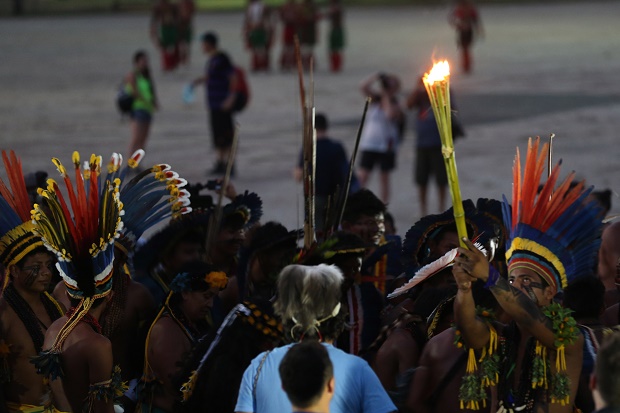Fire & feathers: Brazil kicks off ‘Indigenous Olympics’

Manoti Indians light up a torch with the sacred fire of the World Indigenous Games in Palmas, Brazil, Thursday, Oct. 22, 2015. Billed as the indigenous Olympics, the games are expected to attract nearly 2,000 athletes from dozens of Brazilian ethnicities, as well as from such far-flung nations as Ethiopia and New Zealand. AP Photo
PALMAS, Brazil—Athletes from tribes around the world kicked off what’s being dubbed the indigenous olympics on Thursday with the lighting of a sacred fire in Brazil’s Amazon city of Palmas.
The event is billed as a chance for indigenous peoples from as far as Ethiopia and Mongolia to test their mettle alongside other traditional tribes in sports including archery, spear throwing, and racing with heavy logs.
At sunset, members of 24 Brazilian ethnic groups led the ceremonial lighting of a flame in central Palmas to symbolize energy and life and world unity. Tribes took turns dancing around the fire in front of City Hall until dark.
The opening ceremony was not until Friday, but already the soccer tournament—one of the more mainstream sports included in the program—was under way.
About 1,800 athletes from 23 countries were scheduled to take part, watched by an expected 10,000-30,000 spectators a day.
This was the first year that Brazil has opened its annual indigenous games to foreigners, giving it the flavor of what some describe as a low-key version of next year’s Summer Olympics, being staged in Rio de Janeiro.
But critics of the World Indigenous Games point to Brazil’s deepening recession and political turmoil, as well as an ugly background of expansion by farmers into the traditional lands of Brazil’s indigenous people.
Folklore and tensions
The concentration of indigenous groups, many decked out in traditional garb, brought a splash of color to a remote, dusty city rarely visited by tourists.
At the sports center outside the city, dozens of people in robes and feathers disembarked from buses. Broad-chested men with symmetrical black markings on their faces walked with groups of women who pulled along children.
Something of a head dress fashion show developed, featuring black and green and yellow feathers. There were grass skirts, painted bare chests, sculpted hairstyles—and, not infrequently, modern sunglasses.
Some headed to the sporting area and some set up stalls in hopes of selling to journalists and other visitors. With the heat making even some of the tough indigenous athletes mop their brows, ice cream vendors did especially well.
But police helicopters flying overhead were a reminder of potential tensions.
Raul Pako, a Brazilian man from the Canela people who had come to take part in tug-of-war and archery, said he had mixed feelings about the event.
“I am very happy because before we took part in a national event, which was good, but today it’s the first world games,” Pako, who had a weathered face and a thick necklace of green beads, said.
However, conditions at the games’ humble equivalent of an Olympic Village made him wonder how much the athletes were valued.
“We’re missing a lot of things here. We’re missing water, we’re missing a few other things too, like soap,” he said, adding that the bus trip was difficult because “there was no air conditioning or toilet.”
“The organizers who got the buses are pirates,” he said.
Ubiranan Pataxo, of Brazil’s Pataxo people, questioned whether the excitement of the games reflected the reality for indigenous tribes whose ancient ways of life are under siege from farmers, environmental degradation and cultural pressure.
“It’s great that the indigenous games have become the world indigenous games,” said the muscular, bare-chested young man, who sported black and ochre paint on his skin, large wooden ear piercings, and a flamboyant headdress of white, red and blue plumes.
“We can show the whole world, the whole country, what a real Brazilian is—a warrior fighting even now to preserve our culture and to survive the massacres, the discrimination, the rape of our women,” he said.
“This is the moment to celebrate, but also to make our demands so that the government hears us and notices what’s happening to our planet, what’s happening to our forests, and to our rivers.”
RELATED STORIES
Brazil currency tumbles, but Olympic ticket prices stay put
Rio Olympic, Paralympic ceremonies to be low-budget














